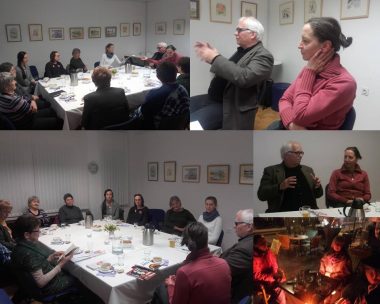
Project duration: 1 September 2015–31 August 2017
Contemporary philosophers, social scientists and artists have already indicated that we cannot consider reality as a determined singular entity with mono-causal logic and universal validity. On the contrary, a multiform phenomenon of reality, contextually sensitive and highly specific at the same time, is always represented according to the observer – his/her perspective and his/her perceptive categories. The project Echoes of Realities came out of these multicultural reflections and objections. It deals with contemporary re-evaluation of cultural patterns and habits in post-socialist and post-nationalist, multicultural world. Its aim is to juxtapose different social identities (minorities, migrants, refugees, women, homosexuals, diasporas, subcultural groups) as captured in literary narratives, and rethink the ties between complex realities of various social environments and their multiple and often also divergent ways of representation. The title of the project thus stresses this connection between social (reality) and personal representation (echo).
Selected works (seven books from Polish, Czech, German, and English landi,guage) are chosen with regard to the author’s capability and sensibility to address these questions in outstanding literary language and explain a paradigm rupture between old and new world (mentality) in a delicate manner. All authors deal with mechanisms of memory/remembrance, and some also with strategies of social oblivion/personal amnesia. All authors are developing their personal style in relation to the past constructions of their literary figures or to their future projections. None of the selected authors is limited by anachronistic discursive strategies and normative world view, just the opposite, all are able to manifest and articulate today’s risky identity shifts, nomadic subjects and contradictory cultural diversity. With selected books we offer literary and social tools to think about realities and their representations more closely.
Supported works, translated into Slovene language:
– Marica Bodrožić: Kirschholz und alte Gefühle*; from German by Ana Jasmina Oseban
– Radka Denemarková: Příspěvek k dějinám radosti / Prispevek k zgodovini radosti; from Czech by Tatjana Jamnik
– Ignacy Karpowicz: ości; from Polish by Jana Unuk
– Jan Němec: Dějiny světla*; from Czech by Tatjana Jamnik
– Ben Okri: The Famished Road / Cesta sestradanih; from English by Urban Belina
– Minoli Salgado: A Little Dust on the Eyes; from English by Ana Jasmina Oseban
– Olga Tokarczuk: Xięgi Jakubowe; from Polish Jana Unuk
*EU prize for literature winners.
Three reading clubs, moderated by PhD. Iztok Osojnik, have been organized in the frame of the project:
* What Books Have to Say at the Ljubljana City Library,
* Tea with Literature at the First Grammar School in Celje and
* Reading with PhD. Iztok Osojnik at the Grosuplje City Library.
Translated works
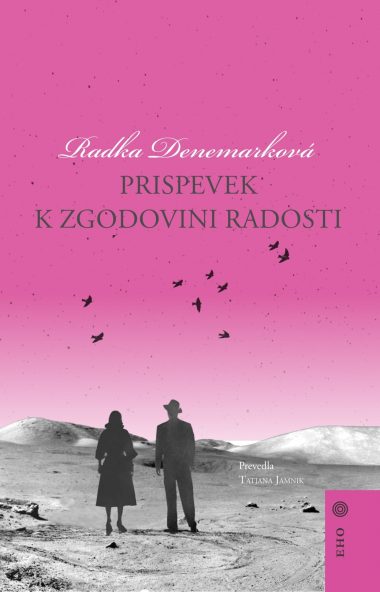 Radka Denemarková: A Contribution to the History of Joy (translator: Tatjana Jamnik)
Radka Denemarková: A Contribution to the History of Joy (translator: Tatjana Jamnik)
The novel is conceived as an exciting thriller and has many parallels with the film noir. An elderly rich man has apparently committed suicide, although the police have their doubts about the cause of this strange death. In the course of his tireless search for the true reasons behind it, a perceptive Policeman is led to a mysterious house near Prague’s Petřín hill. Mysteries and motives mount up, as do hours spent with the young Widow. We are haunted by a burning question: How much more violence and war must there be before the misery at last makes us human?
Radka Denemarková is the only Czech writer who has received Magnesia Litera prize three times (in different categories – for prose, non-fiction and translation).
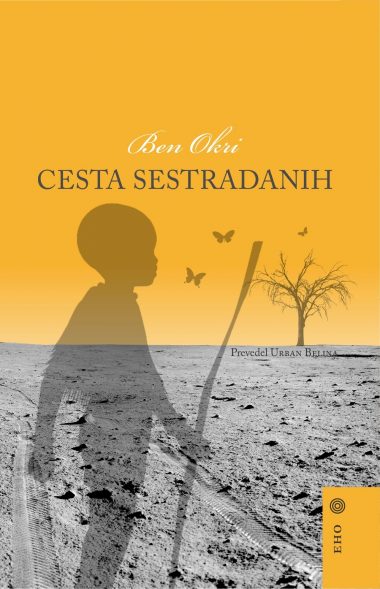 Ben Okri: Famished road (translator Urban Belina)
Ben Okri: Famished road (translator Urban Belina)
Okri lures us into an enchanted spiritual trip of an abiku, a spirit child named Azaro, trapped between the world of living and the world of the dead. Azaro is trying to find reasons to choose to stay alive, in an unnamed state amidst civil war, which we manage to place in Africa. This tough spiritual quest of a child with a semi-naive mind in war devastated homeland is by itself a very challenging theme, but Okri’s literary genius is actually revealed in its true splendour when we approach the last part and gradually realize, that the abiku myth is used as a political metaphor.
In 1991, The Famished Road received the Booker Prize for Fiction.
Marica Bodrožić: A Cherrywood Table (translator: Ana Jasmina Oseban)
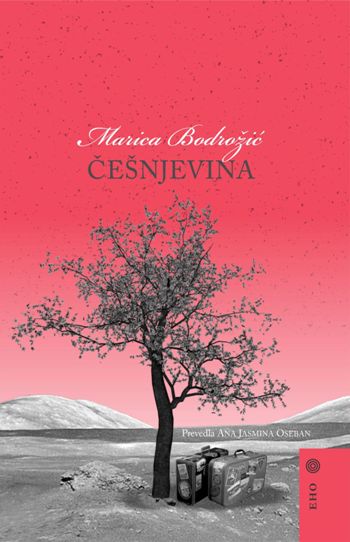 A young woman Arjeta Filipo, who was born and spent her childhood in Sarajevo (“the besieged city”), loses her homeland due to the raging civil war in Yugoslavia. She decides to flee to France and begins studying Philosophy in Paris, where she also gets involved into a stormy and emotionally challenging relationship with an artist Arik. After having finished her studies and her relationship as well, she moves to Berlin. The only thing that follows her everywhere, is her grandmother’s cherrywood table. This inherited piece of furniture helps Arjeta to get centered again after each transition, it helps her get in touch with both painful and happy memories of her past and her family.
A young woman Arjeta Filipo, who was born and spent her childhood in Sarajevo (“the besieged city”), loses her homeland due to the raging civil war in Yugoslavia. She decides to flee to France and begins studying Philosophy in Paris, where she also gets involved into a stormy and emotionally challenging relationship with an artist Arik. After having finished her studies and her relationship as well, she moves to Berlin. The only thing that follows her everywhere, is her grandmother’s cherrywood table. This inherited piece of furniture helps Arjeta to get centered again after each transition, it helps her get in touch with both painful and happy memories of her past and her family.
The book received the EU Prize for Literature in 2013.
Jan Němec: The History of Light (translator: Tatjana Jamnik)
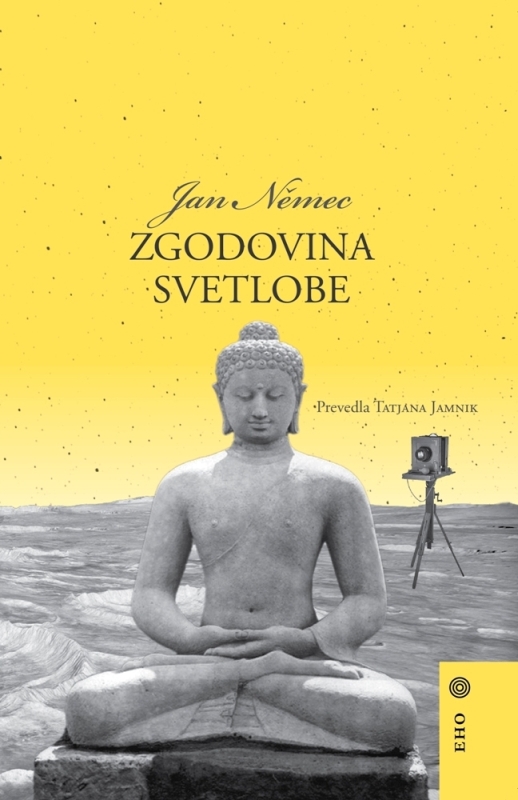 A novel written by Czech writer Jan Němec, captures complex personality of the avant-garde photographer František Drtikol, and follows his path from photography to eastern spirituality and Buddhism. Drtikol’s photographic work has been the subject of study for a number of art historians, while his spiritual followers focused on Drtikol’s Buddhist teachings. But in his novel Němec aspired to capture Drtikol’s life and career in its entirety.
A novel written by Czech writer Jan Němec, captures complex personality of the avant-garde photographer František Drtikol, and follows his path from photography to eastern spirituality and Buddhism. Drtikol’s photographic work has been the subject of study for a number of art historians, while his spiritual followers focused on Drtikol’s Buddhist teachings. But in his novel Němec aspired to capture Drtikol’s life and career in its entirety.
Němec was awarded the 2014 EU Prize for Literature and the Czech Book Prize.
Olga Tokarczuk: The Books of Jacob (translator: Jana Unuk)
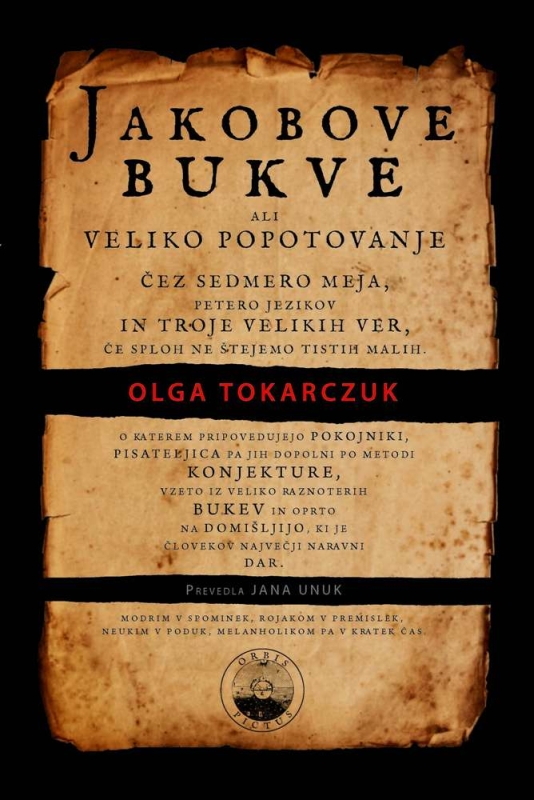 The Books of Jacob is historical novel, set in the 18th century Poland, namely in Poland’s easternmost provinces with their mixed population of Poles, Jews, Ukrainians and other nations. The book, being the reverse side of the canonical Sienkiewicz’ Trilogy, introduces a thoroughly new and unexpected perspective on Polish history of that era, clearly showing the schism between incongruous perceptions of reality, those of different social strata, nationalities, sexes, ideologies, etc. Thereby, the author deconstructs the popular Sienkiewicz’ myth, rethinking the prevailing »truth« about this episode in Polish history. The author’s narrative style takes us straight into the midst of events and the story is told dramatically, in the present tense.
The Books of Jacob is historical novel, set in the 18th century Poland, namely in Poland’s easternmost provinces with their mixed population of Poles, Jews, Ukrainians and other nations. The book, being the reverse side of the canonical Sienkiewicz’ Trilogy, introduces a thoroughly new and unexpected perspective on Polish history of that era, clearly showing the schism between incongruous perceptions of reality, those of different social strata, nationalities, sexes, ideologies, etc. Thereby, the author deconstructs the popular Sienkiewicz’ myth, rethinking the prevailing »truth« about this episode in Polish history. The author’s narrative style takes us straight into the midst of events and the story is told dramatically, in the present tense.
Author won the 2015 Nike literature award for her novel The Books of Jacob.
Minoli Salgado: A Little Dust on the Eyes (translator: Ana Jasmina Oseban)
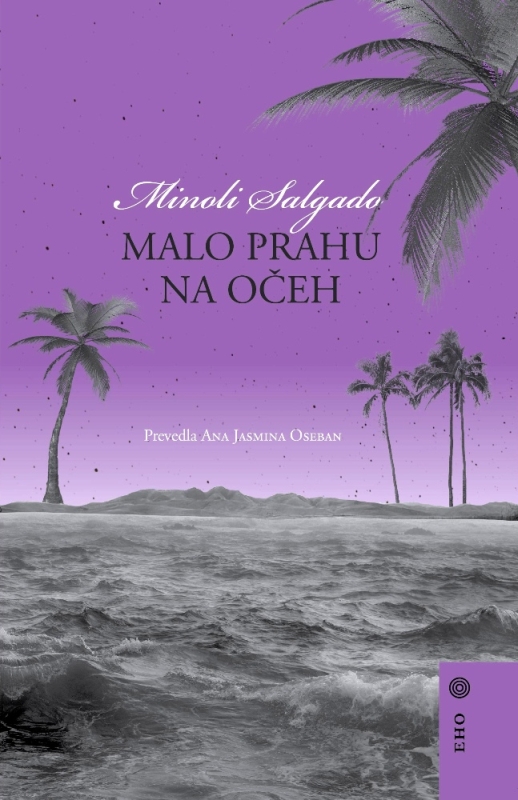 Text is situated in the late 1980s in southern Sri Lanka. Savi, a Sri Lankan research student in the UK, has lost her way in life, when she unexpectedly receives a wedding invitation. Meanwhile in a coastal town in Sri Lanka, her cousin Renu is researching the secret of Bradley’s father’s sudden disappearance as she works with the wives and widows of the disappeared. On Savi’s return to Sri Lanka, the cousins are reunited and compelled to confront truths that put them into direct conflict in their understanding of both the past and themselves. As the story unfolds to its unavoidable end, a tsunami strikes and carries them all into a future that seems to be even more disturbing than the past.
Text is situated in the late 1980s in southern Sri Lanka. Savi, a Sri Lankan research student in the UK, has lost her way in life, when she unexpectedly receives a wedding invitation. Meanwhile in a coastal town in Sri Lanka, her cousin Renu is researching the secret of Bradley’s father’s sudden disappearance as she works with the wives and widows of the disappeared. On Savi’s return to Sri Lanka, the cousins are reunited and compelled to confront truths that put them into direct conflict in their understanding of both the past and themselves. As the story unfolds to its unavoidable end, a tsunami strikes and carries them all into a future that seems to be even more disturbing than the past.
The book has been awarded Leeds Literary Prize.
Ignacy Karpowicz: Spikes (translator: Jana Unuk)
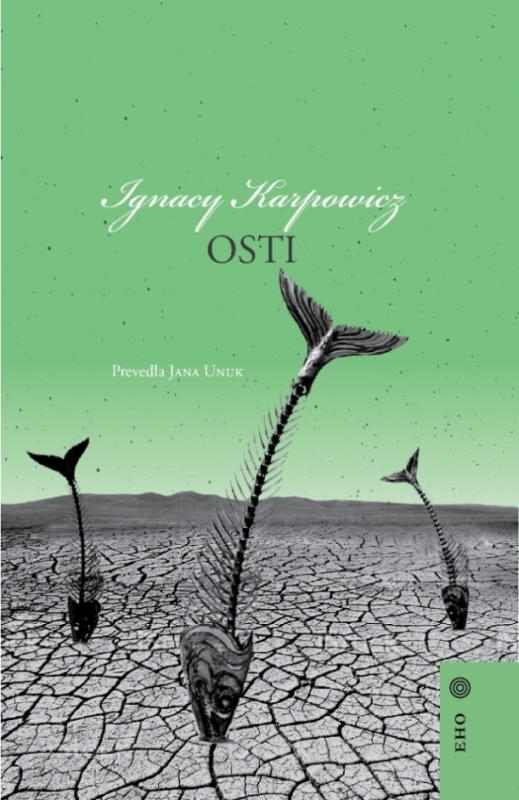 Spikes is a modern urban novel, which depicts non-typical relations among people, especially unconventional families: a renowned sociologist Ninel begins an affair with Norbert, who happens to be Max’ lover. Max, a Vietnamese, performs as Warsaw’s favourite drag queen, but from Monday to Friday he leads a regular married life with a Catholic Polish woman Maria, who is acutely aware of her husband’s secret life. Psychically labile Maya is not able to make up her mind between her husband Simon and her lover Frank, who is Ninel’s son. In either case, deceptions and extramarital affairs do not result in the destruction of marriage, but –on the contrary– lead into expansion of the protagonists’ contacts with the outside world.
Spikes is a modern urban novel, which depicts non-typical relations among people, especially unconventional families: a renowned sociologist Ninel begins an affair with Norbert, who happens to be Max’ lover. Max, a Vietnamese, performs as Warsaw’s favourite drag queen, but from Monday to Friday he leads a regular married life with a Catholic Polish woman Maria, who is acutely aware of her husband’s secret life. Psychically labile Maya is not able to make up her mind between her husband Simon and her lover Frank, who is Ninel’s son. In either case, deceptions and extramarital affairs do not result in the destruction of marriage, but –on the contrary– lead into expansion of the protagonists’ contacts with the outside world.
Novel got the Nike Readers’ Choice Award (2014).








